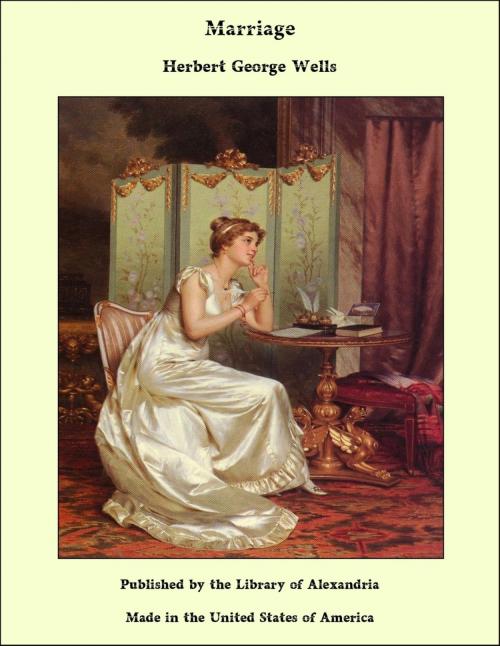| Author: | Herbert George Wells | ISBN: | 9781465626103 |
| Publisher: | Library of Alexandria | Publication: | March 8, 2015 |
| Imprint: | Language: | English |
| Author: | Herbert George Wells |
| ISBN: | 9781465626103 |
| Publisher: | Library of Alexandria |
| Publication: | March 8, 2015 |
| Imprint: | |
| Language: | English |
An extremely pretty girl occupied a second-class compartment in one of those trains which percolate through the rural tranquillities of middle England from Ganford in Oxfordshire to Rumbold Junction in Kent. She was going to join her family at Buryhamstreet after a visit to some Gloucestershire friends. Her father, Mr. Pope, once a leader in the coach-building world and now by retirement a gentleman, had taken the Buryhamstreet vicarage furnished for two months (beginning on the fifteenth of July) at his maximum summer rental of seven guineas a week. His daughter was on her way to this retreat. At first she had been an animated traveller, erect and keenly regardful of every detail upon the platforms of the stations at which her conveyance lingered, but the tedium of the journey and the warmth of the sunny afternoon had relaxed her pose by imperceptible degrees, and she sat now comfortably in the corner, with her neat toes upon the seat before her, ready to drop them primly at the first sign of a fellow-traveller. Her expression lapsed more and more towards an almost somnolent reverie. She wished she had not taken a second-class ticket, because then she might have afforded a cup of tea at Reading, and so fortified herself against this insinuating indolence. She was travelling second class, instead of third as she ought to have done, through one of those lapses so inevitable to young people in her position. The two Carmel boys and a cousin, two greyhounds and a chow had come to see her off; they had made a brilliant and prosperous group on the platform and extorted the manifest admiration of two youthful porters, and it had been altogether too much for Marjorie Pope to admit it was the family custom—except when her father's nerves had to be considered—to go third class. So she had made a hasty calculation—she knew her balance to a penny because of the recent tipping—and found it would just run to it. Fourpence remained,—and there would be a porter at Buryhamstreet! Her mother had said: "You will have Ample." Well, opinions of amplitude vary. With numerous details fresh in her mind, Marjorie decided it would be wiser to avoid financial discussion during her first few days at Buryhamstreet. There was much in Marjorie's equipment in the key of travelling second class at the sacrifice of afternoon tea. There was, for example, a certain quiet goodness of style about her clothes, though the skirt betrayed age, and an entire absence of style about her luggage, which was all in the compartment with her, and which consisted of a distended hold-all, a very good tennis racquet in a stretcher, a portmanteau of cheap white basketwork held together by straps, and a very new, expensive-looking and meretricious dressing-bag of imitation morocco, which had been one of her chief financial errors at Oxbridge. The collection was eloquent indeed of incompatible standards.... Marjorie had a chin that was small in size if resolute in form, and a mouth that was not noticeably soft and weak because it was conspicuously soft and pretty. Her nose was delicately aquiline and very subtly and finely modelled, and she looked out upon the world with steady, grey-blue eyes beneath broad, level brows that contradicted in a large measure the hint of weakness below. She had an abundance of copper-red hair, which flowed back very prettily from her broad, low forehead and over her delicate ears, and she had that warm-tinted clear skin that goes so well with reddish hair. She had a very dainty neck, and the long slender lines of her body were full of the promise of a riper beauty. She had the good open shoulders of a tennis-player and a swimmer. Some day she was to be a tall, ruddy, beautiful woman. She wore simple clothes of silvery grey and soft green, and about her waist was a belt of grey leather in which there now wilted two creamy-petalled roses. That was the visible Marjorie. Somewhere out of time and space was an invisible Marjorie who looked out on the world with those steady eyes, and smiled or drooped with the soft red lips, and dreamt, and wondered, and desired.
An extremely pretty girl occupied a second-class compartment in one of those trains which percolate through the rural tranquillities of middle England from Ganford in Oxfordshire to Rumbold Junction in Kent. She was going to join her family at Buryhamstreet after a visit to some Gloucestershire friends. Her father, Mr. Pope, once a leader in the coach-building world and now by retirement a gentleman, had taken the Buryhamstreet vicarage furnished for two months (beginning on the fifteenth of July) at his maximum summer rental of seven guineas a week. His daughter was on her way to this retreat. At first she had been an animated traveller, erect and keenly regardful of every detail upon the platforms of the stations at which her conveyance lingered, but the tedium of the journey and the warmth of the sunny afternoon had relaxed her pose by imperceptible degrees, and she sat now comfortably in the corner, with her neat toes upon the seat before her, ready to drop them primly at the first sign of a fellow-traveller. Her expression lapsed more and more towards an almost somnolent reverie. She wished she had not taken a second-class ticket, because then she might have afforded a cup of tea at Reading, and so fortified herself against this insinuating indolence. She was travelling second class, instead of third as she ought to have done, through one of those lapses so inevitable to young people in her position. The two Carmel boys and a cousin, two greyhounds and a chow had come to see her off; they had made a brilliant and prosperous group on the platform and extorted the manifest admiration of two youthful porters, and it had been altogether too much for Marjorie Pope to admit it was the family custom—except when her father's nerves had to be considered—to go third class. So she had made a hasty calculation—she knew her balance to a penny because of the recent tipping—and found it would just run to it. Fourpence remained,—and there would be a porter at Buryhamstreet! Her mother had said: "You will have Ample." Well, opinions of amplitude vary. With numerous details fresh in her mind, Marjorie decided it would be wiser to avoid financial discussion during her first few days at Buryhamstreet. There was much in Marjorie's equipment in the key of travelling second class at the sacrifice of afternoon tea. There was, for example, a certain quiet goodness of style about her clothes, though the skirt betrayed age, and an entire absence of style about her luggage, which was all in the compartment with her, and which consisted of a distended hold-all, a very good tennis racquet in a stretcher, a portmanteau of cheap white basketwork held together by straps, and a very new, expensive-looking and meretricious dressing-bag of imitation morocco, which had been one of her chief financial errors at Oxbridge. The collection was eloquent indeed of incompatible standards.... Marjorie had a chin that was small in size if resolute in form, and a mouth that was not noticeably soft and weak because it was conspicuously soft and pretty. Her nose was delicately aquiline and very subtly and finely modelled, and she looked out upon the world with steady, grey-blue eyes beneath broad, level brows that contradicted in a large measure the hint of weakness below. She had an abundance of copper-red hair, which flowed back very prettily from her broad, low forehead and over her delicate ears, and she had that warm-tinted clear skin that goes so well with reddish hair. She had a very dainty neck, and the long slender lines of her body were full of the promise of a riper beauty. She had the good open shoulders of a tennis-player and a swimmer. Some day she was to be a tall, ruddy, beautiful woman. She wore simple clothes of silvery grey and soft green, and about her waist was a belt of grey leather in which there now wilted two creamy-petalled roses. That was the visible Marjorie. Somewhere out of time and space was an invisible Marjorie who looked out on the world with those steady eyes, and smiled or drooped with the soft red lips, and dreamt, and wondered, and desired.















